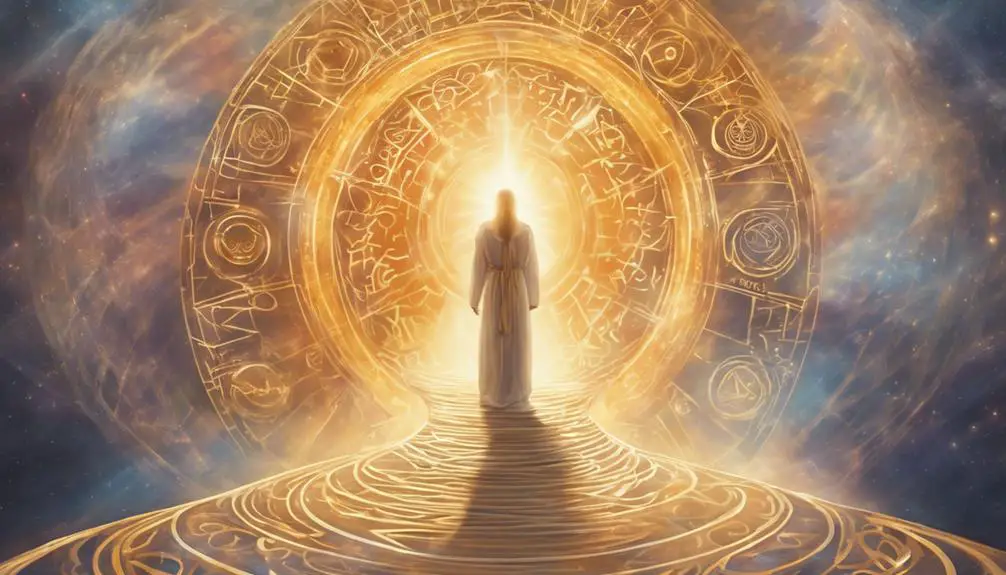An intriguing exploration of Lightworkers in the Bible, unveiling the mysterious roles of these spiritual guides in humanity's path to enlightenment.

Lightworkers in the Bible
Imagine walking through a forest at night, your path illuminated by intermittent stars. This is similar to how 'Lightworkers', as some spiritual circles call them, operate within the Bible.
You may wonder, 'Who were these Lightworkers, and what was their purpose?' They're considered as spiritual beacons, guiding humanity towards enlightenment and higher consciousness.
But where in the Bible do they appear, and what roles do they embody? As you navigate through this intriguing topic, you'll uncover the profound interplay of spirituality, scripture, and these so-called Lightworkers.
And the more you explore, the more mysterious it becomes.
Key Takeaways
- Biblical figures like Moses and Jesus embody the concept of lightworkers, symbolizing spiritual awakening and enlightenment.
- Lightworkers in the Bible served as agents of healing, carriers of divine love, and torchbearers of spiritual enlightenment.
- The roles of biblical lightworkers provide a template for modern-day lightworkers, emphasizing perseverance despite challenges.
- Modern interpretations of biblical lightworkers associate them with New Age practices, but require discernment and openness to diverse perspectives.
Understanding the Concept of Lightworkers

What exactly are lightworkers, you may wonder? Lightworkers, in essence, are individuals who feel a profound inner call to illuminate the world with light and love. They're spiritual beings, driven by their core to heal and uplift humanity.
However, there're popular Lightworker Misconceptions that may distort your understanding.
One common misconception is that lightworkers are divine beings, superior to the rest of humanity. This notion is misleading. While they're spiritually oriented, they're still humans, susceptible to the same flaws and challenges as anyone else. Another misconception is that one must be religious to be a lightworker. In fact, lightworkers can hail from all walks of life, religious or not.
Now, let's delve into Lightworker Origins. The concept of lightworkers isn't new. It stems from ancient spiritual traditions, incorporating elements of Buddhism, Christianity, Hinduism, and other religious philosophies. It's believed that lightworkers have always existed, their purpose unwavering across millennia – to guide humanity towards spiritual enlightenment.
Understanding these origins helps dispel misconceptions and presents a clearer, more accurate depiction of who lightworkers truly are.
Identifying Lightworkers in Biblical Texts

Let's embark on an enlightening journey through biblical texts, seeking to identify figures who may be considered lightworkers in their spiritual context. To fully grasp the biblical symbolism of lightworkers, you have to delve deeper into the scriptures, looking beyond the surface narratives to explore the spiritual and metaphysical nuances.
- Moses: His transformative encounter with the burning bush (Exodus 3:2) could be a metaphor for an awakened lightworker. Moses' subsequent role as a liberator and prophet aligns with the lightworker's mission.
- Jesus Christ: Often depicted as the 'Light of the World', Jesus embodies the quintessential lightworker. He healed the sick, spread love, and exemplified spiritual enlightenment, reflecting a lightworker's calling.
- The Apostles: The apostles, particularly Peter, James, and John, who witnessed the Transfiguration (Mark 9:2-3), represent lightworkers. Their spiritual growth, from simple fishermen to heralds of light, mirrors a lightworker's journey.
Now, let's turn to lightworkers in apocryphal texts. The Book of Enoch, though not canonized, describes Enoch's ascension to heaven and his transformation into the angel Metatron, a powerful figure of light. This narrative echoes the path of a lightworker, further highlighting their presence in biblical and related texts.
The Roles of Lightworkers in the Bible

As you delve into the Bible, you'll see that lightworkers play pivotal roles, often acting as torchbearers of spiritual enlightenment, agents of healing, and harbingers of divine love. They're not just bystanders in biblical narratives; they actively shape the spiritual landscape, illuminating the path for others.
Despite the lightworkers' challenges, such as societal rejection and personal doubt, their unwavering commitment to their divine mission is remarkable. You can learn much from the biblical lightworkers' perseverance, as it often portrays a profound sense of resilience and faith amidst daunting adversities.
Here's a table illustrating some key biblical lightworkers and their roles:
Biblical Figure |
Role as a Lightworker |
|---|---|
Moses |
Deliverer and Lawgiver, guiding the Israelites from slavery |
Jesus Christ |
Healer and Teacher, spreading divine love and wisdom |
Paul |
Evangelist and Apostle, extending the reach of the gospel |
Each of these lightworkers, despite their unique journeys and challenges, played an integral role in shaping the spiritual narrative of the Bible, embodying the essence of divine love, faith, and resilience. Their roles and actions provide a template for modern day lightworkers, encouraging them to persevere despite the challenges they may face.
Lightworkers' Impact on Spiritual Evolution

Building on the roles of biblical lightworkers, you'll find their impact on spiritual evolution to be both profound and transformative. These spiritual guides, in their respective roles, fostered spiritual awakening and nurtured universal consciousness that transcends time and space.
- Fostering Spiritual Awakening: Lightworkers have been instrumental in awakening people to their spiritual potential. Through their teachings and actions, they stirred individuals from spiritual slumber, guiding them towards a path of spiritual enlightenment and growth.
- Nurturing Universal Consciousness: Lightworkers promoted a collective awareness of a shared spiritual journey. They worked to unite humanity under a universal consciousness, emphasizing the interconnectedness of all beings and the importance of collective growth.
- Transcending Time and Space: Even after centuries, the influence of biblical lightworkers remains steadfast. Their teachings continue to inspire spiritual evolution, serving as guiding lights in the spiritual journeys of many.
In essence, lightworkers played pivotal roles in shaping spiritual evolution. Their impact on spiritual awakening and universal consciousness continues to resonate in the hearts and minds of those who seek spiritual enlightenment. This powerful legacy of lightworkers profoundly affects our understanding of spiritual evolution, illuminating our path towards inner growth and universal connectedness.
Modern Interpretation of Biblical Lightworkers

How can we decode the modern interpretations of biblical lightworkers? You'll find that it requires discernment, study, and openness to different perspectives. Today's understanding of lightworkers is engulfed in both 'Lightworker Misconceptions' and 'Biblical Lightworker Controversies'.
Let's delve into some significant interpretations:
Interpretation |
Lightworker Misconceptions |
Biblical Lightworker Controversies |
|---|---|---|
Traditional |
Overly angelic or holy image |
Strict adherence to biblical texts |
Contemporary |
New Age association |
Disregard for biblical context |
Progressive |
Lightworkers are only 'spiritual' |
Lack of conventional religious affiliation |
One common misconception is the image of lightworkers as celestial beings, causing a divinity complex. This often leads to a controversy in the biblical context, especially when they're viewed as strictly adhering to or disregarding biblical texts.
Alternatively, the contemporary interpretation associates lightworkers with New Age practices, leading to controversies about disregarding biblical context.
Progressive interpretations, on the other hand, tend to see lightworkers as purely spiritual entities, which can stir up controversy due to their lack of conventional religious affiliations.
Frequently Asked Questions
How Does the Belief in Lightworkers Integrate With Traditional Christian Theology?
You're exploring how the concept of lightworkers fits within traditional Christian theology.
It's not a straightforward blend. Some might interpret the Lightworker's role in salvation as akin to that of a messenger or prophet.
Yet, this departs from mainstream interpretations which typically uphold Jesus as the sole savior.
Therefore, integrating lightwork into Christian theology requires a broad, flexible understanding of biblical teachings.
Are There Any Notable Figures in the Bible Who Are Not Considered Lightworkers?
Yes, there are notable figures in the Bible not considered lightworkers due to misconceptions about lightworker characteristics. Judas Iscariot, for example, is a significant figure who's not seen as a lightworker. Despite his role in Jesus's story, his actions don't align with the love, healing, and enlightenment associated with lightworkers.
Understanding the true nature of lightworkers helps clarify their presence and roles within biblical narratives.
How Can One Become a Lightworker According to Biblical Teachings?
To embark on a Lightworker's journey according to biblical teachings, you'd first seek spiritual enlightenment.
You'd study scriptures deeply, aiming to embody love, compassion, and forgiveness as exemplified by Jesus Christ.
Practicing selfless acts of kindness and maintaining a strong prayer life are vital steps.
It's not an overnight transformation, but a continuous process of personal growth and spiritual evolution.
You're striving to become a beacon of light, uplifting others through your actions and words.
Are There Any Controversies or Debates Among Scholars Regarding the Identification of Lightworkers in the Bible?
Yes, there's a significant controversy among scholars regarding the identification of 'Lightworkers' in the Bible. The term itself isn't explicitly mentioned, leading to differing interpretations.
Some scholars draw parallels to biblical figures who spread light and truth, while others dispute such connections. This has sparked a biblical references controversy, with no consensus on what constitutes a 'Lightworker' within a Biblical context.
This debate continues, shaping varied perspectives on this spiritual concept.
What Are Some Practical Applications of the Teachings of Lightworkers in Everyday Life?
Practicing Lightworker Meditation can bring calmness and clarity to your daily life. It helps you connect with your inner self, fostering peace and balance.
Additionally, embracing Lightworker Compassion can enhance your relationships. It teaches respect and understanding, encouraging you to empathize with others' experiences.
These applications aren't just theoretical; they're practical tools for improving your mental and emotional well-being.
Conclusion
In conclusion, you can view biblical Lightworkers as key catalysts in spiritual evolution. By identifying their presence and understanding their roles, you gain a deeper insight into the Bible's spiritual teachings.
Whether seen as prophets, healers, or guides, these Lightworkers have significantly shaped humanity's spiritual journey. And in modern interpretation, their legacy continues to inspire and guide those in search of spiritual enlightenment.



Sign up